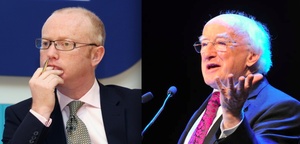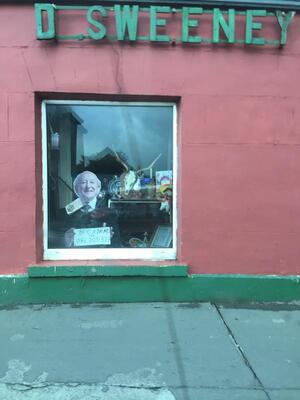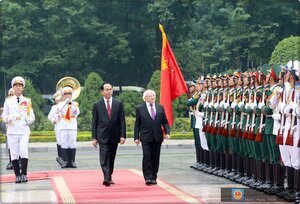 Dan O’Brien (
Dan O’Brien (right left), Economics editor of the Irish Times above, spoke on Today with Seán O’Rourke on RTÉ Radio One this morning concerning’that’ article on the President.
Mr O’Brien claims that President Higgins’ views are becoming increasingly political and partisan, writing:
“His speech [link below] was highly ideological and one-sided. It exclusively extolled left-of-centre thinkers, including some quite extreme figures. All non-leftists mentioned were implicitly traduced. Worst of all, it excluded the majority who occupy the middle ground and who carry little or no ideological baggage.”
Seán O’Rourke: “[Higgins] doesn’t at all accept, he says it’s a complete distortion to suggest that it was an unbalanced speech.”
Dan O’Brien: “Well, let’s just take up one of the things the President just said to you. He said ‘I don’t use the word neo-liberal’. I urge people to go on to Áras an Uachtaráin website and read the speech. It’s about 5,000 words and he uses the term ‘neo-liberal’ or ‘neo-liberalism’ six times. Ok. So his statement to you earlier is, that he didn’t use the term is factually incorrect and that is available on the Áras an Uachtaráin website.”
O’Rourke: “But his point was ‘I don’t divide people in those ways’.”
O’Brien: “Well, neo-liberal, the term ‘neo-liberal’ is a very loaded political term. There is nobody who calls themselves a neo-liberal. The word is a term of abuse by people from one side of the political spectrum for people on the other side of the political spectrum that they don’t like. And it’s a caricature, a caricature term. It’s very like in America when people shout ‘socialist’ at other people, when anybody advocates something they don’t like, usually involving the Government and and example is Obamacare where the government, where the US government is now becoming more like other countries in providing more publically-provided healthcare. Now many people on the American right scream at people who suggest doing that as being socialist. They’re not socialist. And the use of the term ‘neo-liberal’ is the other way around. It’s people on the extreme left, or hard left, using it as a term of abuse for people who are on the other side of the political spectrum and it’s a very divisive term.”
O’Rourke: “What’s your basis for saying that Michael D Higgins’ interventions have become increasingly political and partisan.”
O’Brien: “Well, as I say, the use of that term…”
O’Rourke: “Ok. It’s also the company he keeps intellectually speaking, that’s something that you cited last week in your column in The Irish Times.”
O’Brien: “Ok. So, in that 5,000-word speech or lecture, many of the people that he mentioned approvingly, people like Jürgen Habermas, David Harvey, a Marxist geographer, Ruth Levitas, a sort of utopiast, Philip Mirowski, who would be a sort of left-wing polemicist. The people, the many, many people he cited are, were very firmly on the left. Now, the President is absolutely right. We need to have a debate about these things. There are good ideas on the left and there are good ideas on the right but the President didn’t mention anybody on the right. And if I could just draw a parallel. If Seán Gallagher had become president and he had given a speech and his speech was that our economic system is , the problems we have is because government has become too big and our welfare system has become too generous and our taxes are too high, and he cited a lot of right-wing and free-market people, approvingly, that would also have been inappropriate because a president is a president for the left, for the right, and for centre. He is not a left-wing intellectual now. If he wanted to be, to be a left-wing intellectual, in my view, he should have stayed in day-to-day politics. But, to become president, in our system, as is the case in Italy or Germany, where the president is above day-to-day politics, I think it’s the wrong way to go to make speeches that are very firmly in favour of one political position over another.”
O’Rourke: “He makes the point, earlier in the speech, that the recent crisis has failed so far to prompt any far-reaching self-examination within the departments of economics, in universities across the world, as to how economics is taught and should be taught and what the consequences are of teaching are in terms of policy prescription. What would you say to that?”
O’Brien: “I agree with that entirely.”
O’Rourke: “So what then needs to happen in regard to the kind of people, in so far as he is drawing on others to help him, to draft the speeches, I mean he’d be well capable, and probably did, now one suspects, write this all on his own. But whose thoughts or who else should he be reading, apart from those he quotes?”
O’Brien: “Well it’s more then, you know, the very core of daily politics, of the down and dirty politics that we go through is how much we should tax, how much we should spend, who should be taxed, who should get the spending. And given that our President, the role of our president, is not that of an executive. The Taoiseach is the head of the executive, the president is above that. And, in that regard, I think any president needs to be very careful about getting involved in those day-to-day politics. Take another example, Mary McAleese was, herself, a social conservative. Now, for Mary McAleese, as president, to give speeches on the issue of social conservativism and social liberalism would have been a difficult thing in the sense that people would know where she’s coming from and it’s very difficult to be balanced in that context, because she was a president for both social conservatives and social liberals. Everyone knows that Michael D Higgins is a man of the left, and there’s nothing wrong with that. But he’s not a president of the left, he’s a president for left, right and centre. And therefore, getting involved in this sort of nitty-gritty area of political philosophers, economic philosophers, people who have very strong ideas about how society should be organised, I think is a very dangerous territory for the president of our system to go down because, inevitably, he’s going to be accused of being partisan. And I feel that that speech was highly partisan and not the way to go for the president.”
O’Rourke: “Do you think the Taoiseach, in one of their conversations, should have a quiet word with him about this?”
O’Brien: “It’s really not for me, Seán, to say what the relationship between the Taoiseach and the president should be. I put it like this. It wouldn’t surprise me if, sooner or later, there are conversations. Some of us of an older vintage will recall a president in the past being criticised very strongly by a member of the Government, who then felt, the then president felt he had to stand down. Now I don’t think any of us want a situation where the president feels he has to stand down and we have the distraction of another presidential election. If, for no other reason, I think it would be good if the president weighed a little more of the subjects he wanted to get involved in and how balanced he is in terms of the issues and the people that he describes and discusses and how he raises these issues.”
Squee’s full speech here.
Listen to full interview here.
(Thing EU/Photocall Ireland)





